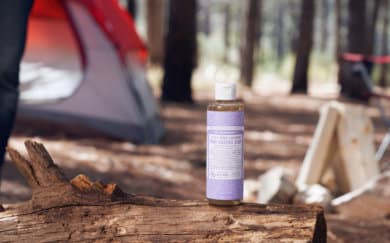My husband knows I’m feeling anxious when I start unloading 20-gallon jugs of water from the back of our SUV. He knows by now that something, maybe an article or a social media post, has triggered my need to be more prepared for a disaster than I was the day before.
For the last eight years I worked as the communications director at a K-8 private school, and attended quarterly disaster preparedness meetings with staff and faculty. The most common concern and potential threat was the possibility of a catastrophic West Coast earthquake. I live in Portland, Oregon, and we’ve been overdue for “the big one” for many years.

That’s why I have a fully prepped disaster kit in my house. Actually, I have several. I have gallons of water and water filters in three locations and a rain barrel outside. I have an emergency backpack in each car and earthquake provisions for our family of eight in a safe location. I give my teenagers pop-quizzes while they’re eating breakfast, “Where are the phone numbers kept? Where is the food? Where is the meeting location? How do you set up the camp stove?” (The last one is a trick question because nobody knows how to set up the camp stove, it’s still in its original box).
It is possible to buy complete emergency kits online or even at big-box stores that are designed to provide a household with the necessary food and supplies for several days or several weeks. These kits are perfectly compact but are mostly filled with an assortment of dried food and cheap products. I prefer to design a kit with my family in mind, using products I know and trust.
Dr. Bronner’s makes three products I have placed in each kit:
- Pure-Castile Liquid Soap: This classic soap is a must have in your kit, useful for a variety of necessities including handwashing, dish washing, bathing and washing clothes.
- Organic Coconut Oil: In Sanskrit, the coconut palm is known as kalpa virkshah, meaning “the tree that supplies all that is needed to live.” Dr.Bronner’s Fair Trade & Organic Coconut Oil can be used for cooking, medical emergencies and grooming. Many naturopaths and nutritionists claim coconut oil has anti-viral, anti-fungal, and anti-inflammatory properties. This post on Survivial Sherpa lists 39 ways to use coconut oil in your disaster kit. While I wouldn’t necessarily use it for all of those purposes, these are my top ten:
- Cooking oil: coconut oil is more stable than olive oil and is a good substitute for butter.
- Energy: a spoonful of coconut oil can be used for nutritional and digestive purposes.
- Moisturizer: coconut oil can be used to relieve chapped lips and feet.
- First aid: apply to cuts and scrapes to provide a protective barrier against foreign matter.
- Bug bites: apply coconut oil to bug bites, stings or rashes to relive itching.
- Burns: apply to burns and sunburns for healing and pain relief.
- Candle: use hardened coconut oil as a candle substitute in an emergency.
- Shaving: can be used for multiple grooming purposes including shaving.
- Make-up remover: in our house, coconut oil is primarily used to remove make-up—specifically mascara—perhaps not needed in an emergency but helpful to know.
- Lubricant: use coconut oil for lubricant on metal or leather and to clean dirty knives and utensils.
- All-One Toothpaste: this toothpaste is a luxury item as both the Organic Coconut Oil and the Pure-Castile Soap can be used to brush teeth. Even so, having good dental hygiene and a sense of normalcy can provide comfort and relief in an emergency.
My hope is that my family will never have to use any of our numerous kits, but if the “big one” does come, we will be stocked and ready with food, water, medical necessities and cleaning supplies—enabling us all to not only survive but help our neighbors as well!